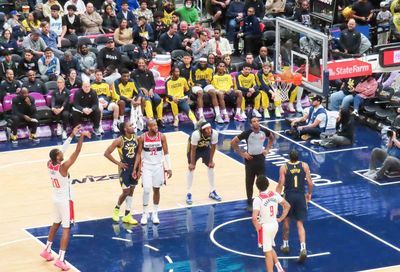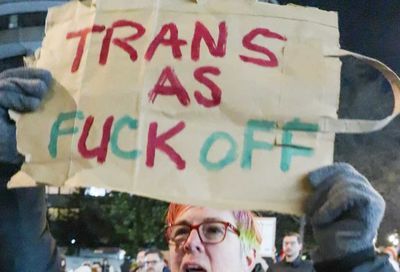DC Court of Appeals Upholds Decision Denying Marriage Initiative
The D.C. Court of Appeals issued its awaited decision in Bishop Harry Jackson’s appeal of the D.C. Board of Elections and Ethics’s decision that his proposed marriage initiative was an improper subject of an initiative. In a 5-4 decision, the court held that the Human Rights Act limitation in District law, which prohibits initiatives or referendums that would violation the Human Rights Act, is permissible. In light of that ruling, all 9 judges agreed that the proposed marriage initiative would violate the Human Rights Act and is, thus, not permitted.
In the absence of a successful appeal, then, D.C. marriage equality, which went into effect earlier this year, cannot be subject to an iniative.
The court, which heard arguments in the case on May 4, held this morning:
[W]e … affirm the Superior Court’s rulings that the Council acted lawfully in imposing the Human Rights Act safeguard and that the Board correctly determined that the safeguard required it to reject the proposed initiative. As we go on to explain, we reach this result because (1) resolution of this appeal turns on what legislative authority the Council intended to share with the people of the District of Columbia when it passed the Charter Amendments Act (the “CAA”); (2) the Human Rights Act safeguard is not inconsistent with the Council’s intent as conveyed by the language of the CAA; (3) this court owes substantial deference to the Council’s legislative interpretation that the Human Rights Act safeguard carries out the intent of the CAA; (4) the relevant history convinces us that the Council could not have intended to authorize, as a proper subject of initiative, any initiative that would have the effect of authorizing discrimination prohibited by the Human Rights Act; (5) the Home Rule Act gave the Council authority to direct the Board, through the legislation that the Council passed to implement the CAA, to refuse to accept an initiative that would authorize prohibited discrimination; and (6) the Board correctly determined that the proposed initiative would have the effect of authorizing such discrimination. On the last of these points, our court is unanimous.
Jackson v. D.C. Board of Elections and Ethics, at 3-4. The court, in its majority opinion written by Judge Phyllis Thompson, and joined by Judges Vanessa Ruiz, Inez Smith Reid, Noel Anketell Kramer and Anna Blackburne-Rigsby, summarizes the plaintiffs’ lawsuit as follows:
Appellants urge us to hold that the Human Rights Act safeguard of the IPA conflicts with the broad right of initiative created by the CAA, and therefore “cannot be used as a basis for disapproving the Marriage Initiative of 2009.”
Id. at 17.
In discussing the challenge, the court held, “In passing the CAA, the Council had to decide the extent of the legislative power it would share with the people.” Id. at 19.
In the most important conclusion to be made by the court, it held:
The Charter amendment that established the right to initiative must be read in conjunction with the Home Rule Act, which, although conferring on the Council broad legislative authority, makes clear that the legislative authority is subject to limits implied by the United States Constitution and to the enumerated limits [set out by Congress.] Since [the section defining the initiative right in the District] obviously could not and did not remove those limits, it cannot be read as expressing the entire scope of restrictions on the initiative right. Rather, [the section] does not purport to address, and is ambiguous as to, whether there are other limitations on the right to initiative (and referendum). The Human Rights Act safeguard[, which prohibits initiatives that would violate the Human Rights Act] is not inconsistent with that ambiguous language.
Id. at 21. Four of the judges of the court disagreed with this conclusion, in an opinion written by Judge John Fisher. He was joined by Chief Judge Eric Washington and Judges Stephen Glickman and Kathryn Oberly. Fisher wrote:
This court must decide, as a matter of first impression, whether the … “Human Rights Act limitation” is a valid restriction on the right of initiative. … [W]e would hold that it is not.
Had our view prevailed, we would not have reached the question whether the Board properly refused to accept the proposed initiative. In light of the majority’s holding, however, and in light of recent legislation recognizing and authorizing same-sex marriages in the District of Columbia, we agree with the majority’s conclusion that the proposed initiative would authorize, or have the effect of authorizing, discrimination prohibited by the Human Rights Act, as amended in 2002.
Id. at 55.
The ruling: 10-CV-20_JACKSON_MTD.pdf
[UPDATE: From the Human Rights Campaign, which has provided support to the D.C. for Marriage efforts:
“The court’s ruling today is a significant victory for justice, the rule of law and the protection of all D.C. residents against discrimination,” said Human Rights Campaign President Joe Solmonese. “It’s time for the National Organization for Marriage to realize equality is here to stay no matter how much money they want to throw at turning back the clock.”]
Support Metro Weekly’s Journalism
These are challenging times for news organizations. And yet it’s crucial we stay active and provide vital resources and information to both our local readers and the world. So won’t you please take a moment and consider supporting Metro Weekly with a membership? For as little as $5 a month, you can help ensure Metro Weekly magazine and MetroWeekly.com remain free, viable resources as we provide the best, most diverse, culturally-resonant LGBTQ coverage in both the D.C. region and around the world. Memberships come with exclusive perks and discounts, your own personal digital delivery of each week’s magazine (and an archive), access to our Member's Lounge when it launches this fall, and exclusive members-only items like Metro Weekly Membership Mugs and Tote Bags! Check out all our membership levels here and please join us today!




















